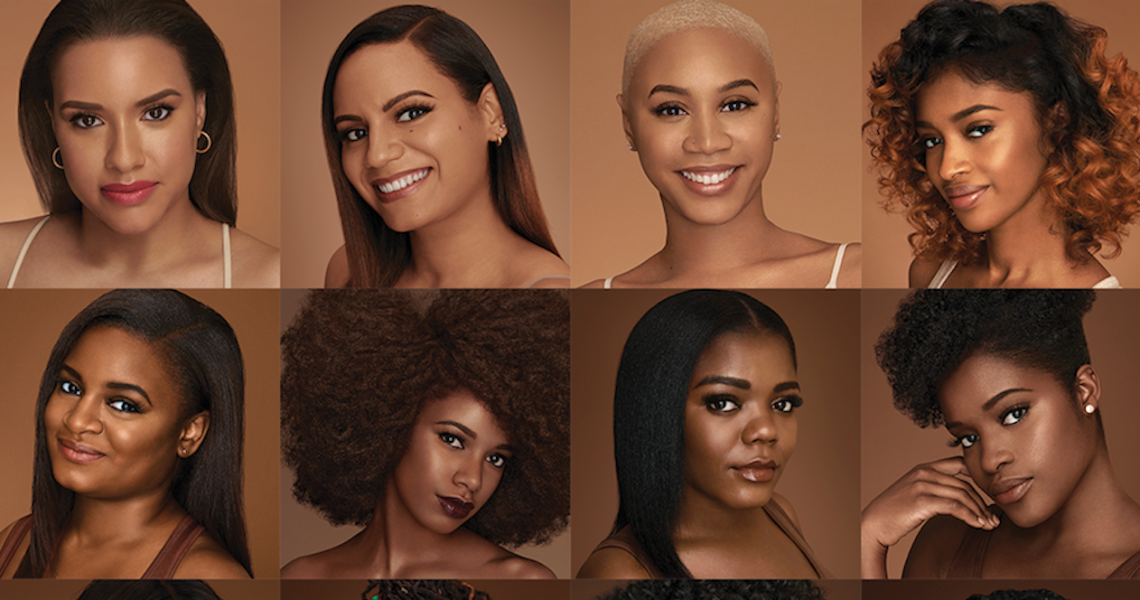As cosmetics brands continue to make moves toward inclusivity via more diverse assortments, 25-year-old makeup line Black Opal Beauty is doubling down on its core customer: black women.
In conjunction with the brand extending the shades of its True Color Skin Perfecting Stick Foundation from 12 to 16 this month, Black Opal is highlighting 16 of its own employees in the best-selling product’s new “I Define My Beauty” advertising campaign. The promotion launches first on BlackOpalBeauty.com and social media, with photos matching the women back to their respective shades and editorial content highlighting each employee’s relationship with makeup. Videos of the employees on the brand’s site and social channels will follow, launching on June 15. Black Opal is largely messaging the campaign via newsletters to its 500,000-plus global email subscribers and 204,800 Instagram followers. Corresponding in-store displays at key mass retailers in the U.S., like Rite Aid, CVS and Walmart, will roll out in early 2020.
Black Opal has no plans to reach the industry’s new 40-shade standard, set by Fenty. Maya Brown, head of marketing for Black Opal Beauty, said the brand is emphasizing its core customer and not trying to be everything to every type of women. The brand’s marketing sweet spot is customers between the ages of 24 and 49.
“With the plethora of shades coming to the marketplace — brands have 55, 60, 40 — we are focusing on women of color. We are covering that span of skin tones that falls between a tan beige to the richest of ebony, and we feel we are able to capture the nuances of those shades,” said Brown.
Black Opal would not detail 2018 sales, but it is estimated that the brand hit about $15 million annually. Brown said the brand experienced 17% year-over-year sales growth between 2015 and 2018. Direct-to-consumer is increasingly a focus area for Black Opal and accounts for 20% of sales; the company has seen sales grow by 30% on BlackOpalBeauty.com over the last two years. Third-party retail, which makes up 80% of sales, will remain the company’s primary channel.
While Black Opal is not the first beauty company to showcase its employees in marketing materials — French beauty brand L’Occitane featured its female employees in its “No Filter Needed” marketing campaign in February, and Sephora brought 10 of its cast members into its “Reach Out and Gift” campaign in 2017. Black Opal wants to emphasize that the women conceptualizing products for the brand’s customers are women of color themselves.
“We are a very diverse company with a strong cultural background. We wanted to show the people who are bringing these products to life, testing it and bringing it to marketplace,” said Brown.
Ad position: web_incontent_pos1
While other beauty brands are catering to many customers via inclusion efforts, it is savvy that Black Opal is speaking directly to its segment, which is often overlooked. “Beauty is so personal, so it makes sense that people would want to get personal with the people behind beauty brands. While we haven’t seen this [employee] trend to this extent before, there is some precedent in the beauty world. Both Rihanna and Kylie Jenner play a role in their brands that’s deeper than just lending their big names to the product — they’re designing colors and doing makeup tutorials,” said strategy consultant Valerie Nguyen.
Black Opal’s efforts will be localized as it rolls out internationally, not only by language but also with local talent in countries like France and Nigeria. Those plans are are still being formalized. Brown also predicts the campaign will incorporate customers in its next iteration, as that has already been a popular request via email and social.
“If a regular person understands this and sees themselves in our products and imagery, that is a win,” she said. “Women of color have always been our positioning, and more than ever, customers will feel like Black Opal is made for them.”




